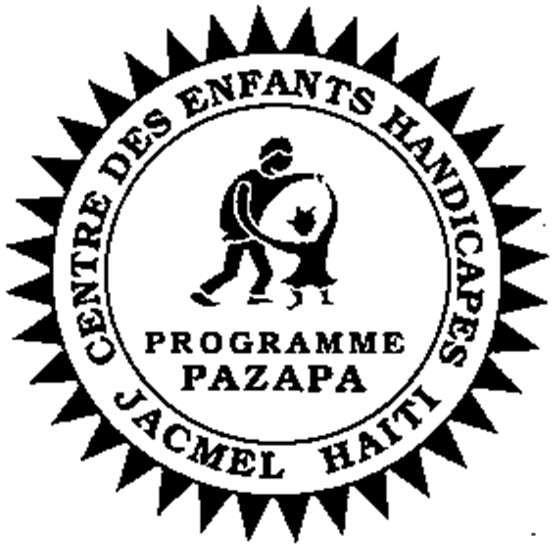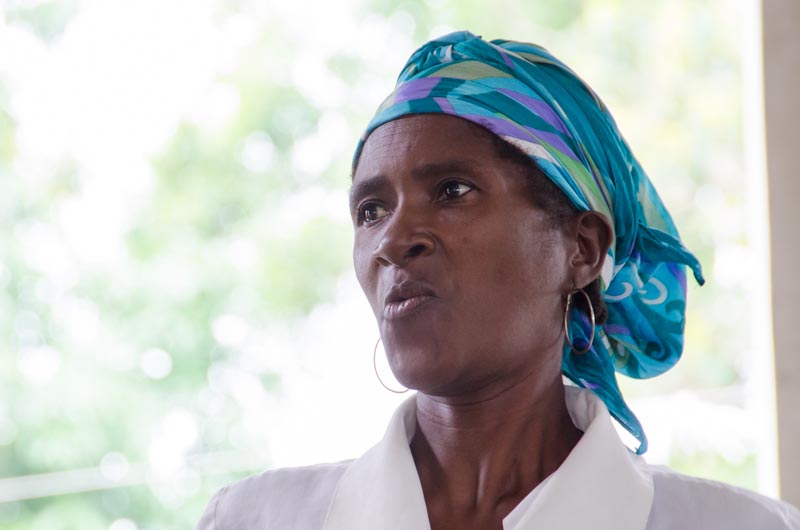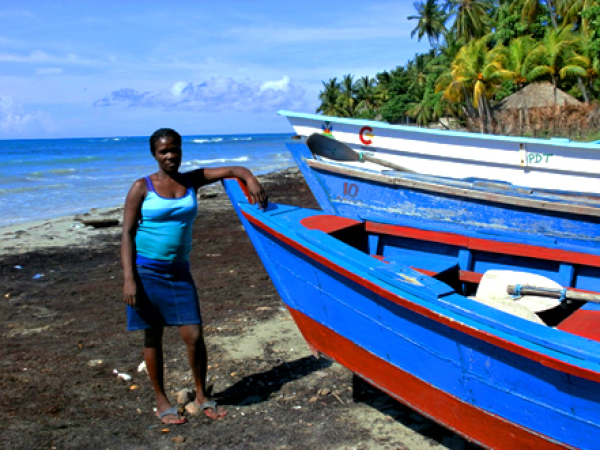"From the Ground Up" – The Financial Times
...A few times a week Pantaleon Joline, 33, brings her adopted daughter Santia Michelle to Pazapa, a centre for disabled children partly funded by the GFC, in the city of Jacmel. Two years ago, she found Santia, then seven months old, abandoned in a hospital. She has Down’s syndrome and hydrocephalus, which causes swelling in the brain. It is impossible not to like her, says Ms Joline, because she is always smiling. But disability is stigmatised in Haiti: Santia’s parents had left her for others to care for. Pazapa, whose name means “step by step” in Haitian creole, was the only place she could go. Thanks to the centre’s support Santia is making progress. She can now sit up straight...
"Because of you, she can go to school" – Global Fund for Children
Odona is a student at the Special Education School run by Pazapa, a [former] GFC grantee partner in Haiti. Disabilities carry a strong stigma in Haiti, but with your support, Pazapa is helping families and communities to understand that all children are worthy of dignity and respect – and an education.
"Step By Step in Haiti" – Thomson Reuters Foundation (by CBM)
...Yesterday I visited an unbelievably inspiring programme called Pazapa, which means "step by step" in Creole. Pazapa is primarily an education centre for about 225 children with disabilities, but in reality it is so much more. It offers nutrition and health care services, family planning, clubfoot and orthopaedic care, community outreach programmes, income generation training, training/education for parents of children with disabilities, rehabilitation, vocational training for older students, sign-language classes for the hearing impaired and home visits for parents and children who can't attend the school. [...] I met a woman, Leon Isador, whose two year old son Leonel is in the early intervention programme [...] Leonel has trouble standing and walking and cannot communicate like other children his age. Leon has three children, her house was destroyed in the quake and she and her husband are struggling to make ends meet. When I asked her what Pazapa means to her she smiles and says Pazapa is supporting the entire family. I ask her to explain and she tells me that Leonel has a place to come and play with other children, receive physiotherapy, and she receives training on caring for a child with a disability. But that's not all. She explains that she is part of Pazapa's livelihood programme...
"Stigma Holds Back the Disabled in Haiti" – The Financial Times
...Jesusla, 22, spends most days alone with her mother, Marie Bonel Mericia, in their simple tin-roofed house shaded by coconut and palm trees in Jacmel, a town on the coast of the Caribbean country of Haiti. But once a week Jesusla, who has cerebral palsy and epilepsy, receives a visit from Mona Charles, a teacher who works for Pazapa, which provides healthcare and education to disabled children and is backed by the Global Fund for Children [...] Over the past 14 years Ms Charles and her colleagues have played and sung with Jesusla, taught her how to solve jigsaw puzzles and how to dress and feed herself...
"Hopeful Youth and the Promise of Global Change" – Plan International, Canada
...In Haiti, children with disabilities are among the most vulnerable populations. Their disability often prevents them from getting to school and the stigma they face for living with disabilities often makes them invisible. But at PAZAPA, children with disabilities receive treatment, such as correction of clubfoot, and education and training, such as trade skills like sewing; these opportunities help PAZAPA’s children imagine and realize bright futures...
Invisible Children: Reimagining International Development at the Grassroots – By Maya Ajmera with Gregory Fields
(PAZAPA is one of the "innovative community-based organizations featured in the book successfully reaching the world's most marginalized children.")
...The global agenda for children has failed, and must be reconsidered from a new perspective. Invisible Children provides the architecture of that perspective, based on a new global web of relationships stemming from the community level. At the heart of this book is the reimagination of how society supports the most vulnerable children in the world. Invisible Children identifies the children who are beyond the reach of top-down international development programs, and offers ways in which their lives may be changed through community-based interventions. In so doing, Invisible Children identifies and gives voice to the millions of children globally living on society’s margins while showing a way forward as to how we can best invest in children...
"Building Back Better: Pazapa School, Haiti" – ReliefWeb
...The first accessible, para-seismic, hurricane-proof school building in Haiti – the Pazapa Centre – was inaugurated on February 27, 2015 in Jacmel [...] During his speech at the inauguration, the Deputy General Director of Haiti’s Ministry of Education and Professional Development said that he would inform the Directorate of School Engineering to visit Pazapa and use it as a model for other school constructions in Haiti. CBM has ensured that construction of Building 1 and 2 of Pazapa respected all legal building and accessibility standards. In his speech at the inauguration, the Ambassador of Germany in Haiti, His Excellency Klaus Peter Schick, mentioned that his government was proud of the collaboration with CBM and the good construction work done at Pazapa...
"Success in the Caribbean Sea" – CBM International
Adrecienne lives in a small commune in southern Haiti, Jacmel. In this town, there is a special school attended by about 160 children with disability. This school is run by a local partner of CBM, Pazapa. Besides the education process, another comprehensive and sensitive initiative they hold is a micro-credit scheme that targets local alumni and parents of children with disabilities, regardless of whether they attend the Pazapa school or not. This was good news for Andrecianne and her husband, a fisherman. Together they were struggling to make ends meet for their family of five children. One of them is Jeudi, an eight year old boy, who lives with multiple disabilities. Through partner Pazapa, Jeudi, receives ongoing medication to manage seizures as well as free consultations with a neurologist.
As a fish monger in Cayes Jacmel, which is not far from the lovely beaches, restaurants and hotels of Jacmel, Adrecienne knew that there is fairly good fish and sea food demand among tourists, visitors and locals. Adrecienne therefore had a dream of going higher in the supply chain by owning a fishing boat. She started working towards her dream by saving proceeds from her fish sales then made payments towards the fabrication of the boat, which costs 24,000 HTG (approximately 600 USD). However, for many months, she could not complete the final payment. Thankfully, when she received micro-credit from Pazapa, she immediately used half of that to complete the payment for her boat. She received 10,000 HTG (approximately 125 USD) payable in a six months period in order to accomplish her dream. Now, Andrecianne's boat goes out daily into the Caribbean Sea and returns with fish, most of which she sells to the Jacmel fishermen's association that she belongs to. She paid back the micro-loan and with her husband they are making more money than they did before. The husbands supports their initiative by buying the ice to preserve the fish when needed.
[...]She and her husband used to struggle to pay the bills but now, they have enough to comfortably look after their family and pay school fees for their children.
"A brand new center for children with special needs in the Southeast" – Le Nouvelliste
The PAZAPA Center for Children with Special Needs opened on February 27th in Jacmel. Its new earthquake-resistant building has been adapted to meet the conditions of people with disabilities...
"Five Years After the Earthquake" – The Irish Examiner
...Perhaps the strongest glimmer of hope came from the Pazapa special needs education centre in Jacmel as eager young eyes and minds were being taught at one of the top class education facilities in the region...
"Haiti, 5 Years On" – CBM, Canada
A teacher works with a student at the Pazapa school for children with disabilities in Jacmel, Haiti. Pazapa means “step by step” in Haitian Creole, and offers three levels of education, a program for the deaf and medical assistance including orthopedic, plastic, and neurological surgery, rehabilitation, physical therapy, and occupational therapy...
"Needed: A Rehabilitation System for All Disabled Haitians" – Panos Carribean (by Jean-Claude Louis, Marika MacRae & Harris Huberman)
...[CBR] has been shown to be effective in studies of preschool disabled children and adult stroke patients. Examples of CBR programs are those of the Three D Project in Jamaica, Los Pipitos in Nicaragua, and the Bangladesh Protibondhi Foundation. But CBR programs are neither a cheap nor an easy fix. They require extensive community-by-community organizing, initial and ongoing training, and resources to pay modest salaries for the CBR workers [...] Such programs need consistent, long-term funding and partnerships with public sector health and social service systems. Haiti has the beginnings of such an approach – but just the beginnings. One of Haiti’s few CBR programs is run by PAZAPA – a Haitian NGO based in Jacmel on Haiti’s southern coast...
"People with Disabilities Participated in Carnival" – Haiti Libre
...Over a hundred people with disabilities have marched through the streets of Jacmel, with the slogan "Yon Anviwonman Adapte pou Moun Andikape", Mr. Forjeas Administrator of the Disabled Children Centre (Pazapa), said that with this show, he intended raise awareness the people of Jacmel on the integration of these people into society. "Started in 1996, this traditional parade, supported by the carnival committee of Jacmel and the BSEIPH is an awareness and motivation activity [...] with a Queen Sagine Brutus, a teenager with a disability aged 15."
"Enfants Handicapés à Jacmel" – Plan International (FR)
...After the earthquake, Plan International built a temporary structure so that our partner association, PAZAPA, can continue to care for disabled children in Jacmel...
"Haiti: Fuel TV/Nat Geo's On Surfari" – Outside
...I'm eager to reconnect with the families we haven't been in touch with since the earthquake. And I'm excited to spend some time at the education and care center for handicapped children in Jacmel, deemed Pazapa...
"Invisible Scars Haunt Haiti's Quake Survivors" –The Globe and Mail
..."We're seeing signs that a lot of people are suffering from great depression," said Zidor Fednel, the government's regional delegate in Jacmel. He said more than 50 per cent of the people living in Haiti's southeast region are in what is being termed "great need." Although a national mental-health strategy is in development in Port-au-Prince, it's unclear if the government will be able to muster the resources to help them...
"Northville Teachers Build Connections with Haitian School" – Northville Patch
The opportunity presents a chance to share new ideas between the Haitian school and the district's two special needs schools....We know that the connection to these international countries, based on purposeful work and building bridges and connections, has immeasurably increased our staff's level of knowledge. These educators have provided excellent examples of success in programs and helping our students learn about students from that culture. What our students will gain is an appreciation of the complexity, poverty, and need that is a reality in Haiti...
















